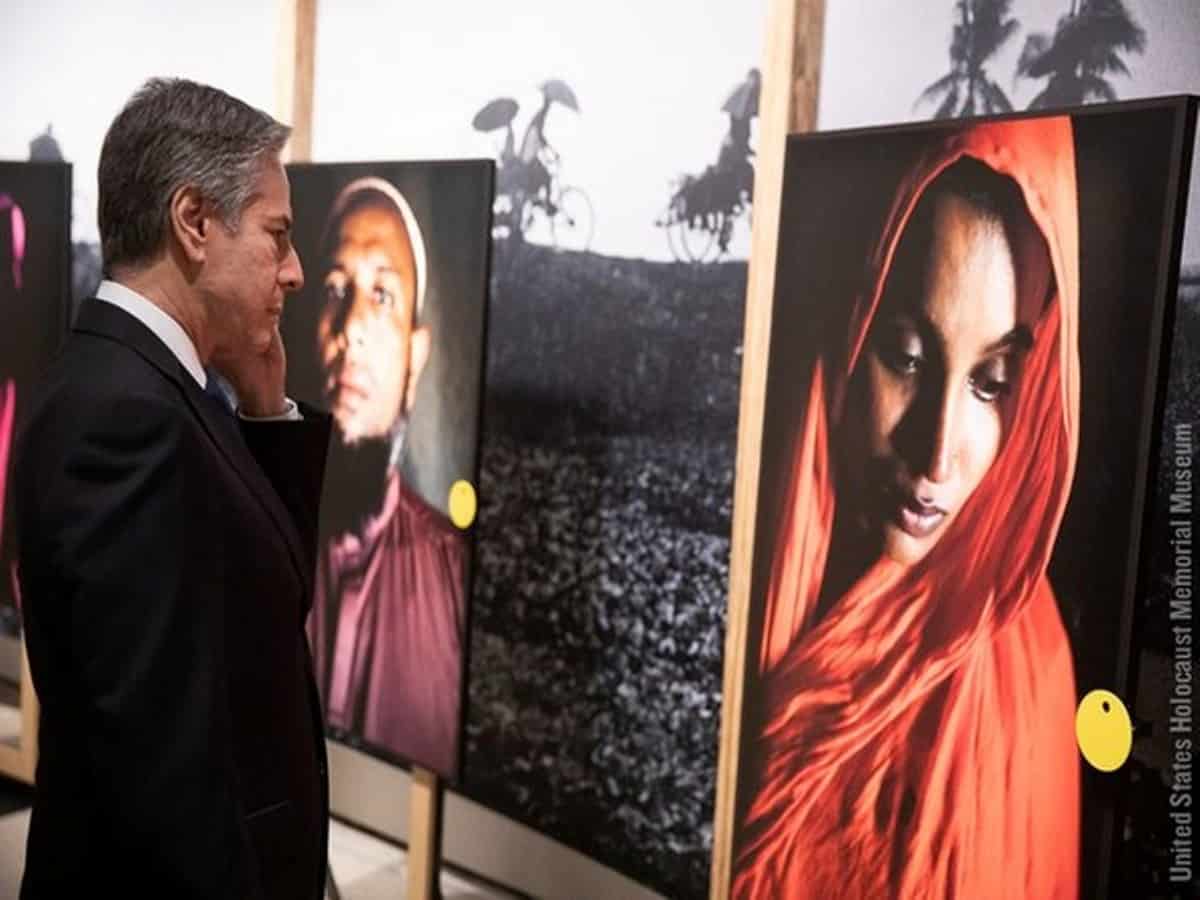

With the United States coming out and formally declaring that Myanmar’s military junta was committing “genocide” against the minority Rohingyas, the international pressure on the ruling dispensation is likely to increase.
Till recently, the US had stopped short of declaring officially that what was happening in Myanmar was “genocide” and not just “ethnic cleansing”.
We may generally use the words genocide and ethnic cleansing interchangeable but legally and under the UN Genocide Convention genocide has a specific definition.
Difference between genocide and ethnic cleansing?
According to Article II, UN Convention on the Prevention and Punishment of the Crime of Genocide, genocide means any of the following acts committed with intent to destroy, in whole or in part, a national, ethnical, racial or religious group, as such:
(a) Killing members of the group;
(b) Causing serious bodily or mental harm to members of the group;
(c) Deliberately inflicting on the group conditions of life calculated to bring about its physical destruction in whole or in part;
(d) Imposing measures intended to prevent births within the group;
(e) Forcibly transferring children of the group to another group.
However ethnic cleansing is supposed to mean systematic forced removal or displacement of an ethnic, racial, or religious group from a given area to make it ethnically homogenous.
Who are Rohingyas?
Rohingya a minority Muslim group is among the most vulnerable forcibly displaced groups who are not given citizenship rights in their own country Myanmar, a majority Buddhist country, on the plea that they migrated to their country during colonial rule from the Indian subcontinent.
Burmese law however allows them citizenship only if they provide proof that his/her ancestors have lived in the country prior to 1823, which most Rohingyas obviously cannot provide.
Rohingyas have therefore become stateless and live in poverty-ridden conditions in the western coastal state of Rakhine and are not allowed to leave without government permission.
Due to ongoing violence and persecution, hundreds of thousands of Rohingya have fled to neighbouring countries. According to UNHCR, over a million Rohingya refugees have fled violence in Myanmar in successive waves of displacement since the early 1990s.
The latest exodus began on 25 August 2017, when violence broke out in Myanmar’s Rakhine State, driving out over a million Rohingyas with more than 742,000 seeking refuge in Bangladesh. The Kutupalong refugee settlement in Bangladesh has grown to become the largest of its kind in the world, with more than 600,000 people living in an area of just 13 square kilometers.
Myanmar army committed genocide: US Secretary of State
US Secretary of State Antony John Blinken recently formally determined that the Myanmar army committed genocide and crimes against humanity in its violence against the Rohingya community.
Speaking at the US Holocaust Memorial Museum where an online exhibition was taking place on Burma’s Path to Genocide exploring how the Rohingya went from citizens to outsiders—and became targets of a sustained campaign of genocide, he also referred to a large number of people killed in the Ukrainian war. He said, “That includes the five people who were killed in a strike on March 1st, on a TV tower and the surrounding area on the outskirts of Kyiv, the same site where, just over 80 years ago, 33,771 Jews were killed by the Nazis in just 2 days ”.
Ukraine is home to nearly 10,000 Holocaust survivors, he added.
He referred to holocaust survival 88-year-old Natalia Berezhnaya of Odessa who in an interview, said, “It’s hard to wrap my mind around the fact that in 1941, I had to hide in the basement of this building, and that I’m going to have to do that again now.”
He said, “Beyond the Holocaust, the United States has concluded that genocide was committed seven times. Today marks the eighth, as I have determined that members of the Burmese military committed genocide and crimes against humanity against Rohingya.”
He said his decision is based on reviewing a factual assessment and legal analysis prepared by the State Department, which included detailed documentation by a range of independent, impartial sources, including human rights organizations like Amnesty International and Human Rights Watch, as well as our own rigorous fact-finding.
A joint report he pointed out by Simon-Skjodt Center for the Prevention of Genocide and Fortify Rights had concluded in December 2018, that there is compelling evidence that Burmese military committed crimes against humanity and genocide against Rohingya.
He said the military targeted Rohingya by the razing of villages, killing, rape, torture, and other horrific abuses.
The military’s attacks in 2016 forced nearly 100,000 Rohingya to flee to Bangladesh. In 2017, attacks killed more than 9,000 Rohingya, and forced more than 740,000 to seek refuge in Bangladesh, he said.
The report was based on a survey of more than 1,000 Rohingya refugees living in Bangladesh, all of whom were displaced by the violence in 2016 or 2017. Three-quarters of those interviewed said that they personally witnessed members of the military kill someone. More than half witnessed acts of sexual violence. One in five witnessed a mass-casualty event – that is, the killing or injuring of more than 100 people in a single incident.
“The attack against Rohingya was widespread and systematic, which is crucial for reaching a determination of crimes against humanity.The evidence also points to a clear intent behind these mass atrocities – the intent to destroy Rohingya, in whole or in part. That intent has been corroborated by the accounts of soldiers who took part in the operation and later defected, such as one who said he was told by his commanding officer to, and I quote, “shoot at every sight of a person,” end quote – burn villages, rape and kill women, orders that he and his unit carried out.”
He said, the intent is evident in the “racial slurs shouted by members of the Burmese military as they attacked Rohingya, the widespread attack on mosques, the desecration of Korans.”
“Intent is evident in the military’s efforts to prevent Rohingya from escaping, like soldiers blocking exits to villages before they began their attacks, sinking boats full of men, women, and children as they tried to flee to Bangladesh. This demonstrates the military’s intent went beyond ethnic cleansing to the actual destruction of Rohingya.”
“Harsa’s 12-year-old son was torn from her arms and forced to lie face down in front of her before soldiers began to stomp on his head and neck.”
Mr Blinken also referred to his “own step-father, Samuel Pisar, who carried with him the loss of his mother, his father, his little sister, and the horrors he’d experienced in the Holocaust, for the rest of his life.”
For example, March 22nd, is the day that the Nazis opened their first concentration camp, in Dachau, just 10 miles from Munich, he said, That occurred in 1933, a dozen years – a dozen years – before my stepfather would be sent to that camp after his time in Majdanek and Auschwitz.
“The museum’s exhibit that I toured shows us the long path to genocide in Burma, how Rohingya, who had been an integral part of Burma’s society for generations, saw their rights, saw their citizenship methodically stripped away.”
In 1962, when the military staged its first coup, it canceled all Rohingya-language programming on the state-run broadcasting service,he said.
In 1978, when the military used a nationwide campaign to register so-called foreigners as a pretext to terrorize Rohingya, forcing more than 200,000 to flee to Bangladesh, he said.
Mr Blinken said, “In 1991, when soldiers carried out killings, rapes, massive destruction of Rohingya communities as part of the military’s so-called “Clean and Beautiful Nation,” driving an additional 250,000 Rohingya to Bangladesh.”
The path is a familiar one, mirroring in so many ways the path to the Holocaust and other genocides.
“We see parallels in the dehumanizing hate speech. Rohingya were compared to fleas, to thorns, to an invasive species, just at Tutsis were compared to cockroaches, and Jews to rats and parasites.
Understanding the contours of this path is a core part of the Holocaust Museum’s mission. It’s crucial to all of us who are committed to living up to the maxim of “Never again.” By learning to spot the signs of the worst atrocities, we’re empowered to prevent them.”
Many of the military leaders who oversaw the genocidal campaign against Rohingya, were the same military leaders who overthrew Burma’s democratically elected government on February 1st, 2021 and seized power.
He said the US with its allies is “ imposing significant costs on the leaders who bear the greatest responsibility.
In June 2021, we’ve led efforts at the UN General Assembly to pass a resolution calling on member states to stop the flow of arms into Burma, which 119 countries supported and only one voted against.
The United States also continues to provide significant support to help meet the immediate humanitarian needs of Rohingya and all affected by their persecution – nearly $1.6 billion since 2017 for everything from shelter and education, specialized mental health and psychosocial support for the victims of trauma.
“I want to recognize the exceptional generosity of Bangladesh in hosting over 900,000 Rohingya refugees, including its recent efforts to vaccinate hundreds of thousands of Rohingya as part of its national COVID-19 vaccination campaign.”
He said the United States government recognizes the gravity of the atrocities committed against them. And it affirms Rohingyas’ human rights and dignity, something the Burmese military has tried to destroy.
“Last week, the UN High Commissioner for Refugees released a report based on interviews with thousands of Rohingya refugees across the region. It found that, despite all they have endured, despite decades of being told they do not belong, two out of three Rohingya refugees still want to be able to return home to Burma one day – as long as they can do it safely, with dignity, with human rights, which is not possible now.
And so, with recent determination, the United States reaffirms its broader commitment to accompany Rohingya on this path out of genocide – toward truth, toward accountability, toward a home that will welcome them as equal members, that will respect their human rights and dignity, alongside that of all people in Burma,” he added.

